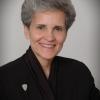"How about it? Say yes. They need you. They really need a piano player for the non-denominational church services on Sunday afternoons. You'd be perfect!"
My insistent friend was making a compelling case. I think about the prospect momentarily, I consider my time availability on most Sunday afternoons, and I respond that I'll follow through.
The follow-through itself is simple. Yes, the facility desperately needs a piano player and, goodness, if you're willing, you just come right on! However, what started out as a simple sounding activity of playing the piano for Sunday afternoon services at a regional rehab facility soon turned into four-plus hours of volunteer orientation, a flu shot, a two-part TB test, and fingerprinting.
But now I'm official and have the photo ID badge to prove it. As I walk from the parking lot to the in-house chapel in my best confident manner now that I know where I'm going, there's a welcome familiarity to be back regularly in a healthcare facility. The happiest 22 years of my career were spent serving in my congregation's hospital ministry.
The weekly non-denominational Christian service is planned and led by the facility chaplain, who is a senior Baptist minister with many wonderful stories about her pastorates. We get along instantly. I'm intrigued by her style. She's intrigued by me being a "real nun."
On Thursdays she emails me the titles of the four hymns we'll be using for the coming Sunday's service. The hymns are from the Lutheran, Methodist, Presbyterian and Baptist traditions. I find the piano music in public domain files on the internet, print the music, practice and bring it with me to the service. Rehab facility patients and their family members attending the service use lyric sheets with the words printed in large type. While the selections are hymns that aren't familiar to me, a little advance practicing and then pre-service review with the chaplain ensure that I quickly get familiar with the songs.
For the last five minutes of each service, the chaplain often calls on me to share a thought and to do the benediction. Moving from the piano bench to the lectern in order to be on the closed-circuit TV broadcast, I offer a brief comment that ties into the chaplain's service theme.
My idea of the benediction is exactly what the chaplain would have chosen: the great priestly blessing from the Book of Numbers. As a Franciscan, I know it as the "Blessing of St. Francis." So without even planning it, we realize there's more commonality than anyone might think.
[Nancy Linenkugel is a Sylvania Franciscan sister and chair of the department of Health Services Administration at Xavier University, Cincinnati Ohio.]
